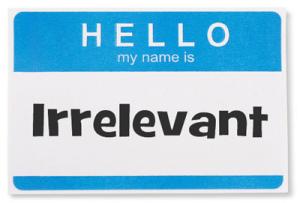You and your business are more likely to become irrelevant before you ever become obsolete. Blackberry is a great example. Its market share for smartphones was 40% in 2010. It is less than 2% today despite an 85% growth in the number of annual smartphone sales. Blackberry didn’t lose market share because it stopped working. It lost because it became irrelevant.
The battle for relevancy comes up in every conversation we have about our own careers and businesses. We are, as a group, obsessed with it. And in this blog, we share how it affects what we do and how we do it. We hope you enjoy our most personal post to date.
From Scott McKain:
Death concerns me; irrelevance terrifies me to the core.
On my 14th birthday, I started a daily job at a small radio station. At 18, elected as president of a student organization, I took to the road full-time to travel and speak on its behalf. I’ve never left the platform since.
In other words, from the day I turned 14 — to this one — there has been an audience for what I have to say, and how I have to say it. I’ve been fortunate beyond description.
However, if I become irrelevant – taking the audience for granted — those wonderful readers and listeners would evaporate, instantly terminating the career I love so much.
That’s why relevance is critical – and scary.
I discipline myself to read constantly, watch shows and sites targeted to other demographics, see avant-garde movies, and stay active on Social Media. I listen each week to Billboard’s top songs via Spotify. I engage with what’s impacting Millennials, not just Baby Boomers.
You can’t pull the covers over your head and stay relevant by accident. You must actively participate in the current culture to ensure you’re prepared for, and perhaps able to influence, whatever comes next.
Or else…
Scott McKain teaches how organizations and individual professionals can create distinction in their marketplace, and deliver the “Ultimate Customer Experience ®.” For more information: www.ScottMcKain.com
From Randy Pennington:
Here is my reality.
- New competitors arrive in my marketplace daily. According to their websites, each is the second coming of Peter Drucker.
- My performance review is delivered every day not annually.
- Longevity in the marketplace – like longevity with a company – used to mean more. Today, the line between value-added experience and being viewed as out of touch is excruciatingly thin.
- My value is determined by the complexity and importance of the problems I help my clients solve.
- My clients choose me because they believe that I provide value. That only happens if I am relevant.
You and your company are just like me. Your customers and employer are asking three questions: Why you? Why now? What makes you relevant today?
For me, staying relevant means that I must constantly:
- Understand my clients’ current challenges and anticipate the ones they’ll encounter tomorrow.
- Be a student of the world – knowing everything I can about what is happening in business, government, and the broader culture.
- Continuously improve my skills and execution.
- Take care of myself mentally, physically, and emotionally.
The privilege of doing what I do depends on remaining relevant. It is the same for you.
Randy Pennington helps leaders deliver positive results in a world of accelerating change. To find out more, go to www.penningtongroup.com.
From Mark Sanborn:
There are three great fears most leaders posses: staying relevant is at the top of the list.
It makes sense: the ability to create results is dependent on relevance: to customers, employees and shareholders. You never hear about successful products or leaders that are irrelevant.
Staying relevant means not resting on past success. I consider success as an early warning indicator for failure. As my pal Joe says, success means only that you know what worked yesterday.
The danger is that our thinking becomes frozen in time. Staying relevant requires “unfreezing” yourself. That means being immersed enough in the present to be able to understand it and speak to it.
Three suggestions:
- Find a millennial to reverse mentor you,
- Pay close attention to current culture even if you don’t agree with it.
- Run you ideas by your kids for feedback. They’ll help keep you relevant.
Mark Sanborn is president of Sanborn & Associates, Inc., an idea studio for leadership development. He is an award-winning speaker bestselling author of books including, The Fred Factor. For more information and free resources, visit www.marksanborn.com
From Joe Calloway:
In the context of business, I believe the key to relevance is understanding your target market. My work is totally irrelevant to most of the marketplace, and that’s fine with me.
I know my audience. I work with CEOs, business owners, and entrepreneurs. If my work, my “product,” isn’t relevant to them, then I’m out of business.
Like some of my friends here are saying, I also endeavor to be relevant in a cultural sense as well as in business matters.
This week in Chicago I spoke to an audience of business owners. I opened by saying that it must be absolutely great to live in Chicago right now, especially if you are a Cubs fan. With that new coach coming in, this will surely be the beginning of a dynasty!
Inside joke to forever frustrated Cubs fans, but the entire audience “got it” and I made a positive connection with them. I’m not a Cubs fan – not even a baseball fan, but I read. That bit of cultural relevance is a competitive advantage to me.
The real test, however, is that my business ideas must be relevant to their success. That’s what I work on all day, every day.
Joe Calloway helps great companies get even better. www.JoeCalloway.com
From Larry Winget:
There are many ways to stay relevant. You can be innovative and create new products and services. Think Amazon Prime with Sunday delivery and video streaming (win) and Amazon Fire smartphone (fail). You can flail around grasping at relevance and end up looking pitiful. Think Jesse Jackson. You can become a big deal to a small market and any kind of deal to a large market (I use both of these tactics.) You can even change your look or your name. Think JCP and KFC.
But be very clear: Staying relevant is hard. That’s because relevance is rooted in change, growth and paying attention. While all three of those things are tough, they are especially tough when you are successful. Businesses in trouble are better at seeking relevance than those that are extremely successful. Failure makes you hungry and courageous to try things because you have nothing to lose. Success creates a blindness of the need to pay attention, change and grow simply because you’re busy being successful. That’s why long term success is something to be admired because it requires taking care of business today while keeping an eye on what you have to do stay successful tomorrow.
Larry Winget, the Pitbull of Personal Development®, is a six-time NYT/WSJ bestselling author, social commentator and appears regularly on many national television news shows. To find out more, go to www.LarryWinget.com.






